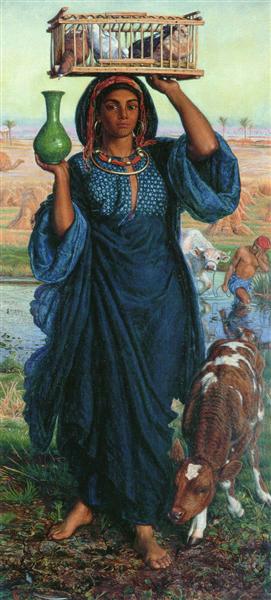תיאור
William Holman Hunt, one of the founders of the Pre-Raphaelite movement, is known for his meticulous attention to detail and his focus on the representation of colour and light. His 19th-century painting The Afterglow In Egypt is an eloquent example of his ability to capture the scenic beauty and atmosphere of Egyptian landscapes and life, as well as his interest in spirituality and narrative in painting.
In this work, Hunt presents a serene view of the Egyptian landscape at sunset, where the soft hues of the twilight sky intertwine with the earthy colors of the surroundings. The clouds that scatter across the top of the composition allow the light of the setting sun to illuminate the scene with a golden glow, creating a fascinating contrast between the elongated shadows and warm hues. This masterful use of light not only showcases Hunt’s mastery of color treatment, but also evokes a sense of calm and contemplation that invites the viewer to immerse themselves in the moment.
The composition of the painting is carefully constructed, with a series of lines that guide the eye towards the horizon. This can be seen in how the water reflects the light from the sky, creating a sense of continuity between the land and the sky. This aspect is characteristic of the Pre-Raphaelite style, which favoured a close observation of nature and the elaboration of visual symbolism through colour. Hunt manages, through his technique, not only to capture a landscape, but also to generate a space where light, time and nature intertwine, offering a visual experience that transcends the merely superficial.
Although there are no discernible human figures in this work, the absence of characters adds a dimension of universality to the painting. The viewer is able to project themselves into the landscape, feeling part of a world where time seems to stand still. This approach can be seen as a reflection on the search for meaning and connection with the divine, recurring themes in Hunt's work. The depiction of empty landscapes and the evocation of deep feelings can be seen in other works of the period, such as those of his pre-Raphaelite contemporaries, who also explored the relationship of the individual with nature and the environment.
An interesting aspect of “The Glow in Egypt” is how it reflects the Victorian era’s fascination with Egypt, a place associated with antiquity and spirituality. Many artists of this period sought to depict scenes that evoked the otherness and exotic beauty of this land. Hunt’s choice to portray such a poetic and ethereal moment, far removed from archaeological or historical aspects, highlights his ability to evoke a sense of wonder and mystery.
In short, “The Glow in Egypt” is a work that encapsulates William Holman Hunt’s mastery of the luminous and contemplative depiction of landscape. Through his use of color and light, as well as his signature style, Hunt invites the viewer to experience a sense of peace and wonder. This work not only stands as a testament to his talent, but also as a visual narrative that links spirituality with nature in an evocative context. The painting, with its delicacy and depth, remains relevant and contemplative, reminding us of art’s ability to reflect the beautiful and sublime in our surroundings.
KUADROS ©, a famous painting on your wall.
Hand-made oil painting reproductions, with the quality of professional artists and the distinctive seal of KUADROS ©.
Painting reproduction service with satisfaction guarantee. If you are not completely satisfied with the replica of your painting, we will refund 100% of your money.

